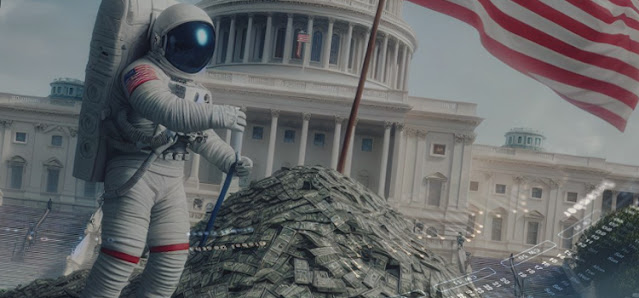Crypto Set To DISRUPT the 2024 Election: US Crypto Ownership Now 52 MILLION People Strong, As Industry Prepares $70+ MILLION To Boost Pro-Crypto Candidates...
The crypto industry in the United States is making sure their voice is heard before the 2024 elections. Their primary method of accomplishing this - a Political Action Committee (Super PAC), which is an organization able to raise and spend an unlimited amount of money on political activism - such as funding ads for, or against specific candidates.
Going by the name 'Fairshake PAC' they have only one goal - a reasonable and clear regulatory landscape for crypto. This means companies no longer having to guess if SEC believes a 50 year old law written before the internet existed will be applied to crypto.
The Super-PAC Already has an Impressive $78 Million Raised, With Elections Nearly a Year Away, the Final Number is Expected to be Much Higher...
The PAC's financial backing comes from a coalition of "20 leading companies and voices in the industry" which includes notable names such as Coinbase, Circle, Kraken, the Winklevoss brothers, Ripple, Messari, Andreessen Horowitz, and others.
Fairshake's mission is clear: "To champion leaders who actively support progressive innovation, encompassing blockchain technology and the broader crypto industry." More specifically, the leaders elected in 2024 will be the ones to sign crypto regulations into law, so making sure these regulations will be fair, reasonable, and well-defined is important.
With 52 Million Americans Now Owning Digital Assets, We Now Have The Power To Sway Elections...
If just 14% of crypto owners see crypto as their main factor in deciding who to vote for, it would be enough to flip the who won the popular vote in the last 2 elections.
They're also willing to extend support to candidates from both political parties, emphasizing the inclusive nature of their agenda.
It's Easy To Instantly React Negatively to Anything Involving Money and Politics...
The community of crypto traders and investors is too large to not to have a seat at the table. While the major industry players are funding this Super PAC, crypto's popularly is how they're able to afford it.
From companies with hundreds of employees, to the independent crypto trader - we all want crypto regulations that treat us fairly, and are written by people who understand the fundamentals.
This isn't a matter of perception, members of the current US Congress are officially part of the oldest congress in entire US history - and nothing seems to highlight this generational gap more than tech related issues. Many lawmakers come from the 'senior citizen' demographic, they have held seats in Congress and the Senate for decades, and on multiple occasions where they were expected to announce their retirement, ended up announcing their run for re-election.
If there's any advice I'd give those who will be representing crypto in Washington DC, it would be that they take the time to figure out how to explain crypto to people who don't know how to send an e-mail. These politicians have proven themselves to be a 'high risk' when it comes to believing misinformation and alarmist headlines. In many cases you can find them discussing their struggles with technology in their own words - they called computers and smartphones 'confusing' and 'challenging', and joke about relying on their grandchildren for tech assistance.
We Need to Educate Lawmakers, Before They Make Any New Laws...
Candidates and their campaign managers will be aware of which industries have the largest budgets in the current election cycle, which is why a couple experts/VIPs from crypto industry can ask for, and successfully setup meetings in various lawmaker's offices. Here the pro-crypto case can be made, common anti-crypto misinformation can be corrected, and the politician can ask any questions they may have.
It is essential we the opportunity to present straightforward facts to lawmakers before they cast votes that can significantly impact the future of the crypto industry.
A perfect example of the kind of senseless challenges the industry faces is Brad Sherman, a Democrat from California. He's been there 10 years, will be running for re-election in 2024, and holds the extreme opinion that crypto should be banned entirely. He is unable to mention 'Bitcoin' without immediately framing it as something only useful in 'illegal activities' - his anti-crypto statements begun at the same time his largest campaign donor was a credit card processing company facing charges of illegally providing services to black market online gambling sites.
For Example, Here's How I would Lobby a Politician who Believes Crypto is Just used by the 'Bad Guys'...
Think crypto fraud has a larger total price tag after seeing multiple headlines over the past year about a hack where losses totaled in the millions? Well, crypto fraud was the source of about $2.5 billion in losses last year according to the FBI. Sure, that is a lot...unless you compare it to anything else. The lowest-tech payment method, paper checks, was used in over $8 billion of fraud last year. Credit Card fraud totaled around $3.5 billion - meaning crypto fraud was the lowest among all payment methods.
Crypto fraud peaked during and shortly after Bitcoin's first major bull run, people rushed to get into crypto, and scammers cashed in on people hoping to get a piece of the action. After learning the hard way, nowadays, most people know no one can promise 'daily guaranteed profits' and companies that have no information on who owns and operates them may be hiding this info for a reason.
This leads to another powerful stat lawmakers need to be aware of - as crypto usage has grown, the annual rate of illegal/fraudulent transactions has gone down, for almost 3 years now. The biggest drop was this year, 2023 - and the firm that works with the FBI on crypto fraud cases is the source for this data.
Once this fact is established, any anti-crypto argument based on fighting crime or stopping fraud sounds ridiculous... unless they're anti-credit card and anti-check as well.
In Closing...
The crypto industry is ready to make its voice heard in the 2024 elections, and there is power in numbers. But the number more important than the amount of money the industry can spend in Washington DC, will be the 52 million crypto owners in US who will decide what standards, and how much effort we demand from our leaders. If united, this is who ultimately will determine winners and losers.
---------------
Author: Ross Davis
Silicon Valley Newsroom
GCP | Breaking Crypto News


